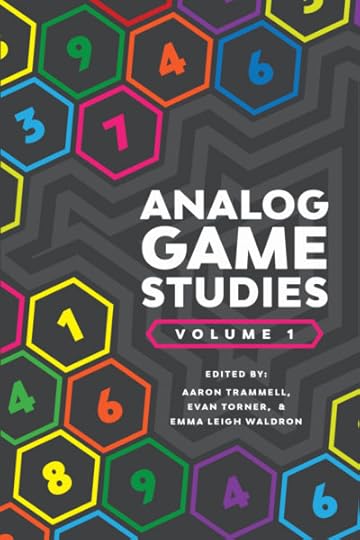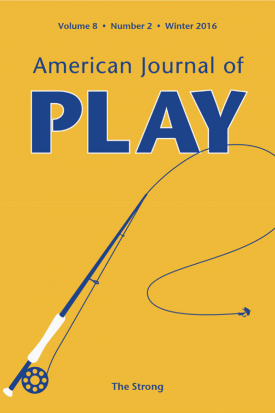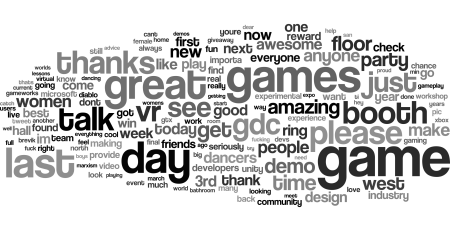Jesper Juul's Blog, page 12
December 5, 2016
New issue of the G|A|M|E Journal, 5/2016
For your theoretical perusal.
G|A|M|E – n. 5/2016
vol. 1, 2016 – Journal (peer-reviewed): Games on Games. Game design as critical reflexive practice (edited by Giovanni Caruso, Riccardo Fassone, Gabriele Ferri, Stefano Gualeni, Mauro Salvador)
G. Caruso, R. Fassone, G. Ferri, S. Gualeni, M. Salvador – Games on Games. Game design as critical reflexive practice
S. Gualeni – Self-reflexive Videogames: Observations and Corollaries on Virtual Worlds as Philosophical Artifacts
P. Barr – Critical Jostling
R.J.S. Sloan – Nostalgia Videogames as Playable Game Criticism
B. Schrank – Bust A Cup: Reclaiming Risk in Play
D. Cox, M. Beale -NorthPoint Courtesy Services Development and Design Summary
J. Micallef – Illusion Master: Extending Self-Presence and Challenging Immersion in and through Digital Games
E. Torner – The Self-Reflexive Tabletop Role-Playing Game
vol. 2, 2016 – Critical Notes (non peer-reviewed)
Books
G. Alonge – P. Harrigan, M.G. Kirschenbaum (eds): Zones of Control. Perspectives on Wargaming
M. Salvador – A. Bossom, B. Dunning: Video Games. An Introduction to the Industry
G. Nencioni – F. Giordano, B. Perron (eds.): The Archives. Post Cinema and Video Game Between Memory and the Image of the Present
November 2, 2016
Game Studies vol 16, issue 1
Game Studies: The International Journal of Computer Game Research has just published its latest issue (Volume 16, Issue 1, October 2016). All articles are available at www.gamestudies.org/1601.
Editorial
The Battle for Open Access Publishing – And how it affects YOU
by Espen Aarseth
There is an ongoing battle for the heart and soul of open-access publishing. And it is not going well.
Articles
Game Sound in the Mechanical Arcades: An Audio Archaeology
by Karen Collins
This paper provides an “audio archaeology” of the penny arcades, exploring the uses of sound in the electro-mechanical era of games.
Is Every Indie Game Independent? Towards the Concept of Independent Game
by Maria B. Garda, Paweł Grabarczyk
We argue that “indie game” is a distinct narrow notion within a wider concept of “independent game”. The latter can be explained as a disjunction of three types of independence (financial, creative and publishing) and it is associated, in a given historical period, with different contingent properties determined by the game culture of the era.
Regional Game Studies
by Bjarke Liboriussen, Paul Martin
Game studies is undergoing a regional turn marked by an increase in research conducted in and focussed on areas outside of Western Europe and North America. The development of “regional game studies” will extend the field’s ability to engage with important global issues and enrich game studies with new perspectives and concepts.
The Vitruvian Thumb: Embodied Branding and Lateral Thinking with the Nintendo Game Boy
by Daniel Reynolds
Describes a confluence of forces that shaped the development of the Nintendo Game Boy. Argues that the Game Boy exemplifies a relationship between technologists, media technology, and users. Encourages theorists to consider the bodily and other material constraints that inform the development of media platforms.
Book Reviews
Book Review: John Sharp’s Works of Game
by Veli-Matti Karhulahti
Works of Game: On the Aesthetics of Game and Art (2015) by John Sharp. Cambridge: MIT Press. ISBN: 9780262029070. 146 pp.
September 7, 2016
Wide Screen Journal on Videogame Adaptation
The Wide Screen Journal has a special issue on Videogame Adaptation.
Table of Contents
Essays
“Introduction – Videogame Adaptation: Some Experiments in Method” – Kevin M. Flanagan
“Metaproceduralism: The Stanley Parable and the Legacies of Postmodern Metafiction” – Bradley J. Fest
“8-Bit Goes to the Movies” – Kyle Meikle
“Subjective and Affective Adaptations: Remediation and the Playstation 2 Videogame” – Cameron Kunzelman
“Visiting the Videogame Theme Park”- Bobby Schweizer
“Playing Los Angeles Itself: Versions of and from the Historical City in LA Noire and the ‘Semi-Documentary’ Noir” – Jedd Hakimi
“Gotham on the Ground: Transmedia Meets Topography in Environments of the Arkham Videogame Series” – Kalervo A. Sinervo
*
PS. As much as I support Open Journal Systems, there must be a way to cut down the number of clicks I need to make to get to the PDF. At least just take me directly to the PDF when I click PDF, rather than putting the PDF in a tiny frame?
August 18, 2016
New Paper on the Pay Once & Play Problem of Video Game History
Bac k from the 2016 DiGRA/FDG conference in Dundee, here is the paper I gave on using design patterns to understand video game history: Sailing the Endless River of Games: The case for Historical Design Patterns.
k from the 2016 DiGRA/FDG conference in Dundee, here is the paper I gave on using design patterns to understand video game history: Sailing the Endless River of Games: The case for Historical Design Patterns.
The Pay Once & Play category was introduced in the Apple App Store in early 2015. Though video games were for a long time, at least from 1985 to 2015, mostly sold in boxes for upfront payment, this business model was not actually named as “Pay once & Play” until after the emergence of the free-to-play or freemium business model. Why not? Because it was obvious that all video games were sold in boxes, so why would you mention it when talking about video games, or video game history?
This is the topic of the paper: The problem isn’t just that games change, but that games change in ways we haven’t predicted. The major events in video game history concern things that had previously been taken for granted: MMOs like World of Warcraft moved the role of the player community to the forefront; casual games reconfigured the audience; mobile games reconfigured distribution and business models; independent games set up a new relation between developer and audience. Video game history continually forces us to reconsider what it is we are studying, when we study video games.
In the paper I then propose that we can redefine game design patterns to help us to talk about video game change. I return to matching tile games as an example of how to write history using design patterns.
http://www.jesperjuul.net/text/endlessriverofgames/
July 1, 2016
Journal of Games Criticism Extending Play
For theory!
The Journal of Games Criticism is proud to announce the publication of its first special issue, edited by Aaron Trammell and Zack Lischer-Katz. Adapted from the Extending Play: The Sequel conference held at Rutgers University in 2015, this issue’s articles and interviews consider matters surrounding sequels and repetition in the world of video games and their study. The issue is available at http://gamescriticism.org/issue-3-a and the full list of articles is listed below.
Considering the Sequel to Game Studies… by A. Trammell & Z. Lischer-Katz
The Extending Play conference at Rutgers University in 2015 underlined the importance of sequels and repetition to games and their study. Here the editors discuss these themes and introduce the interviews and articles that were adapted from the conference for this bonus issue.
The Replication of Ideology: An Interview with Adrienne Shaw and Marcus Boon by Melissa Aronczyk
Shaw and Boon examine the iterative and repeating forces of ideology that work within games as a culture industry and play as a cultural practice. They discuss the importance for scholars to take these visible and invisible forces of power into account within the study of games.
Liberating Play: An Interview with Anna Anthropy and Miguel Sicart by A. Gilbert
Anthropy and Sicart discuss the centrality of games within the discipline of game studies and consider how lessons learned from play studies might curb stagnation in the field.
Hanging in the Video Arcade by S. Tobin
This paper decenters play and the player in the arcade by exploring another subject I call hangers. It explores the genealogies of player control, engagement and the policing of play practices in the American video arcade in the 1980s.
This paper first establishes the criteria necessary to construct a digital interactive narrative game that contains both narrative agency and ludic agency before considering those criteria against two interactive narrative games: Mass Effect 2 and Elder Scrolls V: Skyrim.
Imperialism in the Worlds and Mechanics of First-Person Shooters by A. Patel
This paper focuses on two highly popular first-person shooter games, Far Cry 2 and Far Cry 3, and examines how elements of their game worlds and mechanics reinforce (and disrupt) imperialist narratives.
Ludic Spolia in Sid Meier’s Civilization: Beyond Earth by E. McNeil
Using the art historical term spolia as a launching point, McNeil explores the reuse of gaming mechanics and visuals from Sid Meier’s Civilization V in Sid Meier’s Civilization: Beyond Earth. She argues that this reuse was both practical and perhaps unintentionally subversive.
A Proceduralist View on Diversity in Games by G. Smith
Looking at diversity and inclusion through a proceduralist lens allows us to more deeply analyze current games, as well as prompt new questions and avenues for technical and design research.
JGC (ISSN: 2374-202X) is currently seeking submissions from game developers, designers, bloggers, journalists, and scholars for its Summer/Fall 2016 issue. This issue’s submission deadline is August 1, 2016 and will be published on October 8, 2016. We accept articles, book reviews, experimental game reviews, and letters to the editor for review. Our submission guidelines are available at http://gamescriticism.org/submissions/.
June 22, 2016
Analog Game Studies, volume 1
 Your theoretical injection of the day: ETC Press has announced the inaugural issue of Analog Game Studies, edited by Aaron Trammell, Evan Torner and Emma Leigh Waldron.
Your theoretical injection of the day: ETC Press has announced the inaugural issue of Analog Game Studies, edited by Aaron Trammell, Evan Torner and Emma Leigh Waldron.
Contents:
Foreword
Reinventing Analog Game Studies: Introductory Manifesto
ANALYSIS
“Fun in a Different Way”: Rhythms of Engagement and Non-Immersive Play Agendas – Nick Mizer
Strategies for Publishing Transformative Board Games – Will Emigh
Misogyny and the Female Body in Dungeons & Dragons – Aaron Trammell
The Playing Card Platform – Nathan Altice
Orientalism and Abstraction in Eurogames – Will Robinson
DOCUMENTATION
From Where Do Dungeons Come? – Aaron Trammell
Larp-as-Performance-as-Research – Emma Leigh Waldron
Sex and Play-Doh: Exploring Women’s Sexuality Through Larp – Katherine Castiello Jones
O Jogo do Bicho: Pushing the Boundaries of Larp in Brazil – Luiz Falcão
A Nighttime Tale of Xiros – Adam Lazaroff
Visual Design as Metaphor: The Evolution of a Character Sheet – Jason Morningstar
EXPERIMENTATION AND DESIGN
Uncertainty in Analog Role-Playing Games – Evan Torner
Post-Larp Depression – Sarah Lynne Bowman and Evan Torner
Rules for Writing Rules: How Instructional Design Impacts Good Game Design – Ibrahim Yucel
Storium’s Analog Heritage – Lillian Cohen-Moore
Regarding Board Game Errata – Jan Švelch
The Curse of Writing Autobiographical Games – Lizzie Stark
May 3, 2016
Kinephanos journal: Exploring the Frontiers of Digital Gaming
Exploring the Frontiers of Digital Gaming: Traditional Games, Expressive Games, Pervasive Games
Special Issue, April 2016 / Numéro spécial, avril 2016
Edited by / Dirigé par Sébastien Genvo & Carl Therrien
Introduction: Exploring the Frontiers of Digital Gaming:
Traditional Games, Expressive Games, Pervasive Games
SÉBASTIEN GENVO & CARL THERRIEN
Université de Lorraine & Université de Montréal
English | Français
Century of Play: 18th Century Precursors of Gamification
MATTHIAS FUCHS
Leuphana Univesity
Football Manager: Mutual Shaping between Game, Sport, and Community
ALEXANDRE HOCQUET
Université de Lorraine & CNRS
Welcome to the Dollhouse.
Constructing Bodies in Crytek’s Crysis and Mattel’s Kiddle Dolls.
CARL THERRIEN & JOYCE GOGGIN
Université de Montréal / Universiteit van Amsterdam
Replaying the Lost Battles:
the Experience of Failure in Polish History-Themed Board Games
PIOTR STERCZEWSKI
Jagiellonian University in Kraków
Defining and Designing Expressive Games: The Case of Keys of a Gamespace
SÉBASTIEN GENVO
Université de Lorraine
Differentiating Serious, Persuasive, and Expressive Games
GABRIELLE TRÉPANIER-JOBIN
Université du Québec à Montréal
Bridging The Gap Between Game Designers and Cultural Institutions: A Typology to Analyse and Classify Cultural Pervasive Games
DIANE DUFORT, FEDERICO TAJARIOL, IOAN ROXIN
Université de Franche-Comté
World of Warcraft Dramaturgical Approach: A Drama that Plays with its own Limits
VICTOR CAYRES & ADOLFO DURAN
CAPES Foundation, Ministry of Education of Brazil / Federal University of Bahia
April 14, 2016
American Journal of Play 8.2
 Here is American Journal of Play Volume 8, Number 2•Winter 2016.
Here is American Journal of Play Volume 8, Number 2•Winter 2016.
Though technically about the titular play, this journal is becoming increasingly intertwined with game studies.
Interview
Play, Toys, Learning, and Understanding: An Interview with Doris Bergen
Overview Only> Full Text>
Articles
Microgravity Playscapes: Play in Long-Term Space Missions
Marianthi Liapi and Edith Ackermann
Abstract Only> Full Text>
“We Don’t Allow Children to Climb Trees”: How a Focus on Safety Affects Norwegian Children’s Play in Early-Childhood Education and Care Settings
Ellen Beate Hansen Sandseter and Ole Johan Sando
Abstract Only> Full Text>
Blocks, Bricks, and Planks: Relationships between Affordance and Visuo-Spatial Constructive Play Objects
Daniel Ness and Stephen J. Farenga
Abstract Only> Full Text>
Inserting Child-Initiated Play into an American Urban School District after a Decade of Scripted Curricula: Complexities and Progress
Julie Nicholson, Anne Bauer and Ristyn Woolley
Abstract Only> Full Text>
Book Reviews
Thomas S. Henricks, Play and the Human Condition
Miguel Sicart
First Paragraph Only> Full Text>
David F. Lancy, The Anthropology of Childhood: Cherubs, Chattel, Changelings
Garry Chick
First Paragraph Only> Full Text>
Matt Omasta and Drew Chappell, Eds., Play, Performance, and Identity: How Institutions Structure Ludic Spaces
Jennesia Pedri
First Paragraph Only> Full Text>
Carroll Pursell, From Playgrounds to PlayStation: The Interaction of Technology and Play
Howard P. Chudacoff
First Paragraph Only> Full Text>
John Sharp, Works of Game: On the Aesthetics of Games and Art
Chris Hanson
First Paragraph Only> Full Text>
Nathan Altice, I AM ERROR: The Nintendo Family Computer/Entertainment System Platform
Michael Z. Newman
First Paragraph Only> Full Text>
Mary Flanagan and Helen Nissenbaum, Values at Play in Digital Games
Jose P. Zagal
First Paragraph Only> Full Text>
April 7, 2016
ToDIGRA Journal vol 2, No 2 out
For your theoretical pleasure, here is ToDIGRA (Transactions of the Digital Games Research Association) Vol 2, No 2.
Special issue, Snowbird DiGRA 2014
On Chairing a Games Research Conference
Jose P Zagal
We Are All Fishes Now: DiGRA, Feminism, and GamerGate
Shira Chess, Adrienne Shaw
Exploring the Cause of Game (Derived) Arousal: What biometric accounts of player experience revealed
Gareth Schott, Raphaël Marczak
Reconciling Csikszentmihalyi’s Broader Flow Theory: With Meaning and Value in Digital Games
John Hamon Salisbury, Penda Tomlinson
A Structural Model for Player-Characters as Semiotic Constructs
Daniel Vella
What is Strafe Jumping? idTech3 and the Game Engine as Software Platform
Dylan Lederle-Ensign, Noah Wardrip-Fruin
March 19, 2016
Game Developers Conference 2016 in tweets: March 18
Continued from yesterday, here is March 18 of the 2016 Game Developers Conference, in tweets:
VR is still there, main story is Microsoft hiring dancers for their party. And then, experimental gameplay workshop and a fan giving “David Brevik money to make up for pirating Diablo back in the 90s”.




